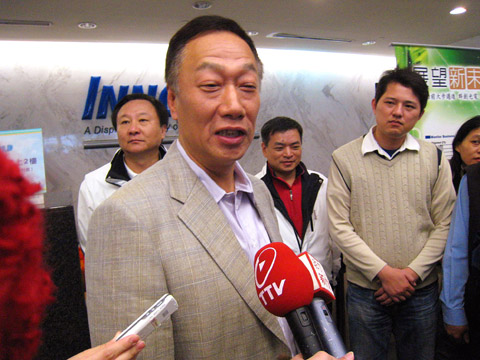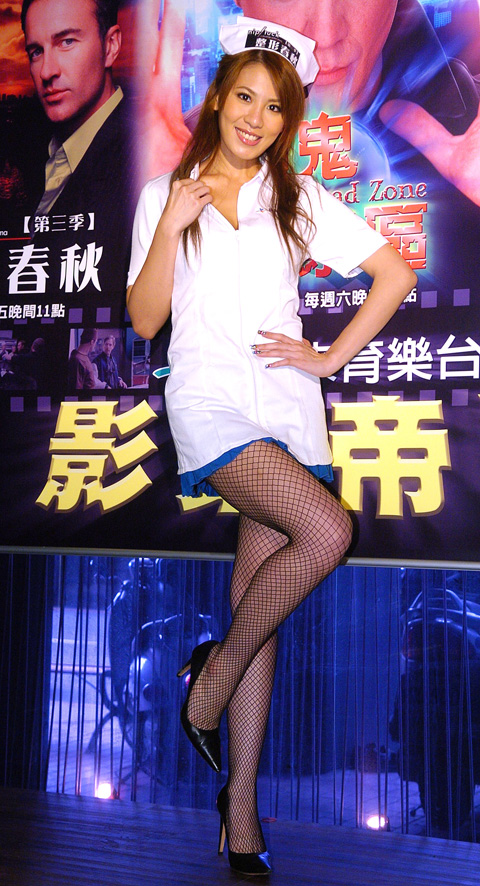Though bouffant-styled entertainer Zhang Fei (張菲) might be able to teach Taiwan’s “home boys” (zhainan, 宅男) a thing or two about picking up members of the opposite sex, he isn’t the man to turn to for lessons in etiquette.
The “eager old fellow” (色老頭), known for his penchant for sweet young thangs, lived up to his reputation this week when he was caught in a fast food restaurant allegedly trying to pick up some hot young lasses by taking photos together and asking for their contact information, according to a report in the Liberty Times (the Taipei Times’ sister newspaper).
Tame stuff, you may think, but what had Netizens in a tizzy was Zhang’s apparent disregard for pedestrians; he had parked his huge road bike in front of the store’s entrance, effectively blocking the way.

PHOTO: TAIPEI TIMES
“I was only in there for eight minutes,” he said, when questioned by the press.
The flagrant flouting of social convention didn’t stop there. The variety show host and one-liner king was said to have carelessly flicked a cigarette butt on the ground and left a pile of garbage on the table rather than throwing it in the trash can.
“Look, I didn’t put the garbage in the trash because I didn’t know it was something I was supposed to do,” he said.

PHOTO: TAIPEI TIMES
Bikes, butts and trash, a far cry from sex, drugs and rock ’n’ roll, but nevertheless a trifecta that goes a long way to explaining Fei’s increasingly bad reputation in the vernacular media.
In other “Godfather of television” (大哥大) news, it seems that entertainer Hu Gua (胡瓜) just can’t get a break. Next (壹週刊) magazine reported on Wednesday that Li Jin-liang (李進良), a plastic surgeon and husband to the variety show host’s daughter, was allegedly caught entertaining two friends and three hostesses in separate rooms at a Taipei hotel.
In typical Next fashion, photographs were published showing a chronology of the plot as it unfolded: The arrival of the three young studs at the hostess bar (8pm); driving with the mama-san (媽媽桑) through the streets of Taipei to pick up three females (12:28am); the three men and three women entering a hotel (12:50am); and exiting the hotel (1:48am).
The denouement, however, was Hu Ying-zhen (胡盈禎) driving her husband home at 2:45am.
When asked by members of the press pack what her husband was doing with the hostesses, Hu Ying-zhen coined what could be a new euphemism: “My husband was just engaged in social activities.”
For Li, though, this is old hat. Loyal readers of Pop Stop will recall that while the couple were betrothed, Li was accused by porn star Hinano Miduki (觀月雛乃) of sexually abusing her for two years — this along with a whole string of rumor and innuendo of Li’s sexual escapades.
On a more romantic note, Terry Gou (郭台銘) might have finally found love.
The Hon Hai Precision Industry Co (鴻海精密) chairman — considered by some to be Taiwan’s most eligible bachelor because of his large bank balance and debonair deportment — has previously been linked with actress Carina Lau (劉嘉玲) and model Lin Chi-ling (林志玲). The lucky woman this time is a dancer named Delia Tseng (曾馨瑩).
“I don’t get the whiff of money from her,” (我在她身上聞不到錢的味道), Gou said, meaning that she’s not dating him for his thick wads of cash.
It’s nice to see that love isn’t dead.

As I finally slid into the warm embrace of the hot, clifftop pool, it was a serene moment of reflection. The sound of the river reflected off the cave walls, the white of our camping lights reflected off the dark, shimmering surface of the water, and I reflected on how fortunate I was to be here. After all, the beautiful walk through narrow canyons that had brought us here had been inaccessible for five years — and will be again soon. The day had started at the Huisun Forest Area (惠蓀林場), at the end of Nantou County Route 80, north and east

Specialty sandwiches loaded with the contents of an entire charcuterie board, overflowing with sauces, creams and all manner of creative add-ons, is perhaps one of the biggest global food trends of this year. From London to New York, lines form down the block for mortadella, burrata, pistachio and more stuffed between slices of fresh sourdough, rye or focaccia. To try the trend in Taipei, Munchies Mafia is for sure the spot — could this be the best sandwich in town? Carlos from Spain and Sergio from Mexico opened this spot just seven months ago. The two met working in the

Exceptions to the rule are sometimes revealing. For a brief few years, there was an emerging ideological split between the Democratic Progressive Party (DPP) and Chinese Nationalist Party (KMT) that appeared to be pushing the DPP in a direction that would be considered more liberal, and the KMT more conservative. In the previous column, “The KMT-DPP’s bureaucrat-led developmental state” (Dec. 11, page 12), we examined how Taiwan’s democratic system developed, and how both the two main parties largely accepted a similar consensus on how Taiwan should be run domestically and did not split along the left-right lines more familiar in

This month the government ordered a one-year block of Xiaohongshu (小紅書) or Rednote, a Chinese social media platform with more than 3 million users in Taiwan. The government pointed to widespread fraud activity on the platform, along with cybersecurity failures. Officials said that they had reached out to the company and asked it to change. However, they received no response. The pro-China parties, the Chinese Nationalist Party (KMT) and Taiwan People’s Party (TPP), immediately swung into action, denouncing the ban as an attack on free speech. This “free speech” claim was then echoed by the People’s Republic of China (PRC),